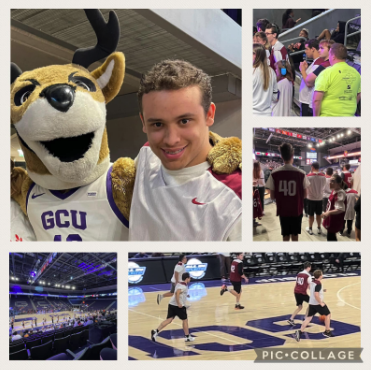Liam had the opportunity to be part of a special event last month at Grand Canyon University (GCU).
He had participated in Hoop.Camp on campus last year and they invited participants to come back for Inclusion Night during their women’s basketball game.
There is no way I would have been able to picture this moment when he was 3, 4, 5, 10, or 12. But Liam really started expanding his abilities in high school being a part of Unified Sports.
Unified Sports Teams are a part of the Special Olympics organization. You’ll find Unified Sports teams all over America – most often on high school campuses. Unified Sports joins people with and without intellectual disabilities on the same team. They believe that training and playing together promotes friendship and understanding.
What was so special about this night at GCU? There was Liam, in a huge college gym with the band playing, cheerleaders cheering, fans yelling, bright lights, motion and commotion everywhere — so much stimulation to the senses. Not to mention he was asked to go down on the main court and play with strangers while listening to coaches he didn’t really know, with his parents far off the court and so many ways to escape. In years past, there is no way I would have let him get out of arms reach from me. Losing him somewhere or him becoming overstimulated and overwhelmed were huge concerns for me.
And yet there he was. Saying hi to his teammates, listening to his coaches, taking team photos, and waiting patiently to be introduced onto the court. He even got to meet Thunder, GCU’s mascot! I was so proud of him, not only did he self-regulate, follow directions, and stay with his team, he did his best to play — following the basketball visually and physically. Working to be a good teammate. Being a good sport. Enjoying his independence.
None of that would have been possible without some key things we worked really hard on every year since we learned he had autism:
- Following directions.
- Staying with your group.
- Using strategies to stay calm and regulate your body.
- Making good choices.
- Being kind to others.
- Trying new things.
- Being part of a team.
- Making new friends.
- Being a good sport.
- Having fun.
- Being open to the possibilities of what you CAN do.
- Having dreams bigger than today, next month or next year.
- Learning to be more and more independent.
- Being confident in who you are and what you are able to do.
No matter how much support your child may need now and how impossible some things may seem, it is still critical to look to the future with hope and to empower ability in our kids. If Liam and I wouldn’t have worked on the foundational skills he needed to navigate this event, he would never have had this opportunity. If I had decided there was no way I could give him options to practice independence (while still considering his safety), he could easily have been trapped in learned helplessness.
There is definitely a balance required between safety and independence, but our kids won’t have the chance to be successful at all if we automatically limit them because we don’t believe they will ever be able to handle certain things.
Even now, with Liam being 19, having a legal guardian, unable to be completely unsupervised at home or in the community I don’t stop working with him on continuing to learn greater independence.
He’s talked about wanting a job at Costco or In-n-Out, driving a car, having his own bank account and getting married. All things that, based on today, are highly unlikely.
Instead of ignoring the desires he’s expressed or discouraging him from those thoughts, I help him see where he is at on the path to get there and what he needs to work on.
For example, to be able to drive a car someday, you need to be able to keep yourself and others safe on and near streets. That starts with crossing streets and parking lots safely on your own. So that’s what we work on. To get married and be responsible to care for someone else in a relationship, you have to be able to be responsible to care for yourself on your own. So we work on things like hygiene, chores, cooking, laundry, managing money, etc.
He may never get to the end of those paths and be able to drive a car or marry someone, but he is not going to hear from me “that’s never going to happen.” If that was my outlook for him at 3, 4, 5, 10 or 12 he would never have participated the way he did at GCU last month. He would have simply learned he was helpless and incapable.
What kind of life would that be? It would be one without hope. As Yisroel Silanter said, “There is no greater disease than the loss of hope.”
I encourage you to fan the flames of hope in your family and with your children, no matter how small. Keep feeding that fire – no matter how slowly you have to do it. Life will be so much sweeter when you do.

Recent Comments